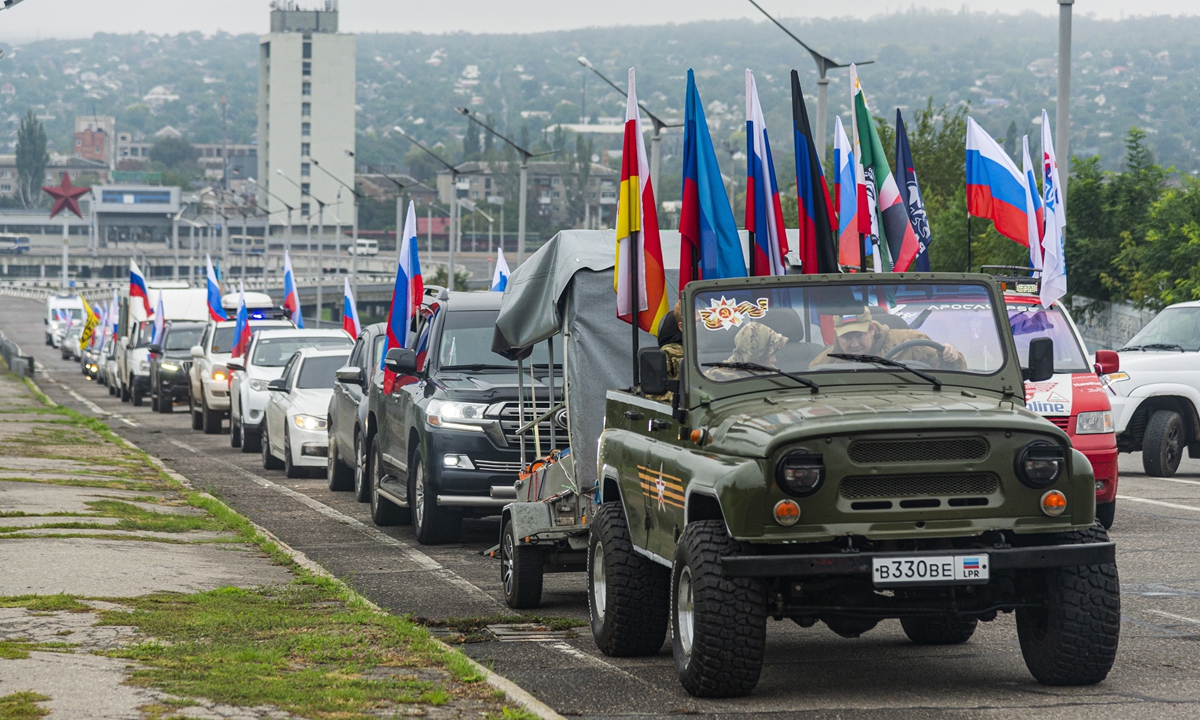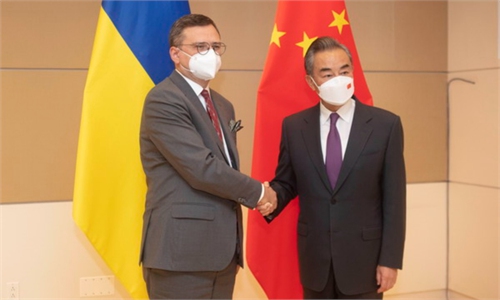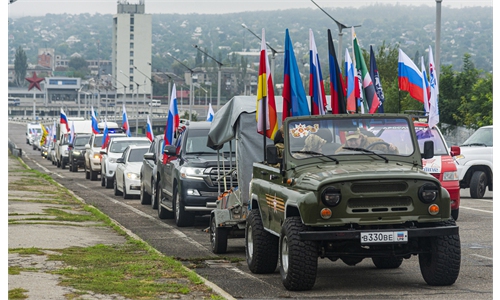Russia-Ukraine conflict ‘to enter new stage’ after referendums
West in dilemma 'whether to get more directly involved'

A motor rally takes place in Luhansk, Ukraine, on September 23, 2022 for a local referendum to join the Russian Federation. The referenda of Donetsk, Luhansk, Kherson and Zaporizhzhia will last through September 27. Photo: IC
The majority of people in Donetsk, Lugansk, Kherson, and Zaporozhye have "voted to join Russia in referendums," according to Russian media. Observers believed that the conflict is certain to intensify and the West will increase military support for Ukraine, while Russia will seek complete control of these regions.
Wang Wenbin, a spokesperson for the Chinese Foreign Ministry, said at the daily press briefing on Wednesday that "as a responsible major power, China has always paid efforts to promote peace and negotiations, and it never sits aside, and never adds fuel to the flame, and will never use the crisis to get benefits. We will always stand on the side of peace, and will continue to play a constructive part in deescalating the situation."
The US is preparing a new $1.1 billion arms package for Ukraine's battle with Russia that will be announced soon, US officials said on Tuesday as Washington awaits the outcome of what it calls "sham" referendums in Ukraine, Reuters reported. The package will be the latest installment in weaponry for Ukraine. The officials said on condition of anonymity to Reuters that the package will be announced in the coming days.
Experts said this would be good news for US military industrial giants as they will benefit from increased orders for weapons, as long as the conflict continues to keep both Russia and Ukraine bleeding.
According to RT, in Lugansk, over 98 percent of voters supported joining Russia, official figures show. Donetsk recorded similar results with more than 99 percent of voters supporting the proposal. Both Zaporozhye and Kherson regions had processed all ballots by late Tuesday, where respectively 93 percent and 87 percent of voters backed "leaving Ukraine and unifying with Russia."
The process of integrating new regions into the Russian Federation may take some time as it requires the approval of Russia's parliament and the president. But Kremlin spokesperson Dmitry Peskov said on Friday that he was "convinced it will be fast enough," RT reported.
Analysts said the result is totally predictable, as quite a number of residents in these regions are pro-Russia or Russian-speaking who have suffered from long-standing conflict with pro-West Ukrainian nationalists, adding that as Russian troops are in effective control of these regions, Moscow has full confidence before holding such referendums. However, it is no surprise that Ukraine and the West will absolutely oppose the referendums, and will try to challenge Russia's attempt to consolidate a new status quo.
Cui Hongjian, director of the Department of European Studies, China Institute of International Studies, told the Global Times that Russia is trying to impact the combat situation on the ground via the referendums, because this will decide whether Moscow upgrades its "special military operation" into "war."
"If Russia formally integrates these four regions into its territory, from Moscow's perspective, the whole conflict will enter a new stage, as it could become a case of 'homeland defense,' and the Ukrainian forces in these regions will be seen as 'invaders on Russian territories,' and then Russia will be able to undertake greater mobilization and input more strength to combat and deter potential interventions from the West," Cui noted.
The majority of the international community will not take sides on the issue, and will mostly react in the same way they did after the Crimea referendum in 2014. Some experts believe that since the referendums this time were conducted amid the conflict, Russia's act to integrate the four Ukrainian regions will be more controversial, while the West will also receive new pressure to decide whether to become more directly involved in the conflict, or just keep sending military supplies but make no further intervention.
If the West does not intervene directly, it will be almost impossible for Ukraine to completely defeat all Russian forces in these four regions, especially after Russia activated partial mobilization, but if the West intervenes in the conflict by force, it will bring direct military conflict between Russia and NATO and could even trigger a nuclear war, so the US now is facing a dilemma, said a Beijing-based expert on international relations who asked for anonymity.
If Russia eventually controls all the territory of these four regions, Moscow would have reasons to stop its military operations, but Kiev is unlikely to accept this as a basis for new peace talks, so there is much uncertainty at the moment, said the expert.
US Ambassador to the UN Linda Thomas-Greenfield introduced a resolution condemning Russia over the referendums and declared that the UN Security Council does not support "the use of force to redraw borders during a security council meeting on Tuesday," a US official told CNN.
Zhang Jun, China's permanent representative to the UN said at the UN Security Council Briefing on Ukraine on Tuesday that "China has noted the latest changes in the situation in Ukraine… Our position and proposition on how to view and handle the Ukraine issue is consistent and clear, that is the sovereignty and territorial integrity of all countries should be respected, the purposes and principles of the UN Charter should be observed, the legitimate security concerns of all countries should be taken seriously, and all efforts conducive to the peaceful resolution of the crisis should be supported."



